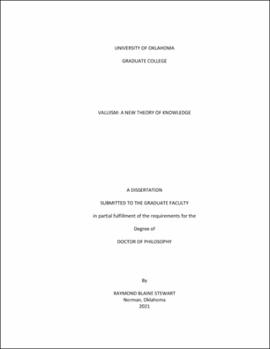| dc.contributor.advisor | Zagzebski, Linda | |
| dc.contributor.author | Stewart, Raymond | |
| dc.date.accessioned | 2021-05-06T21:18:03Z | |
| dc.date.available | 2021-05-06T21:18:03Z | |
| dc.date.issued | 2021-05-14 | |
| dc.identifier.uri | https://hdl.handle.net/11244/329505 | |
| dc.description.abstract | Since Plato, epistemologists have tried to explain why knowledge is more valuable than mere true belief. Traditionally, they have tried to answer this by defining knowledge as true belief plus some additional properties and then tried to explain why these properties are valuable. This dissertation flips this approach on its head. Rather than attempt to explain the value of knowledge in terms of the components that make belief into knowledge, I argue that value itself is what transforms belief into knowledge. It is the sole transformative component of belief. Not only does this approach solve the value problem out of hand, but it can also assist in solving the Gettier problem and can unify otherwise competing theories of knowledge. | en_US |
| dc.language | en_US | en_US |
| dc.subject | Philosophy, Epistemology | en_US |
| dc.subject | Value of Knowledge | en_US |
| dc.subject | Analysis of Knowledge | en_US |
| dc.title | Valuism: A New Theory of Knowledge | en_US |
| dc.contributor.committeeMember | Riggs, Wayne | |
| dc.contributor.committeeMember | Montminy, Martin | |
| dc.contributor.committeeMember | Frick, William | |
| dc.contributor.committeeMember | Ellis, Stephen | |
| dc.date.manuscript | 2021-04-27 | |
| dc.thesis.degree | Ph.D. | en_US |
| ou.group | College of Arts and Sciences::Department of Philosophy | en_US |
